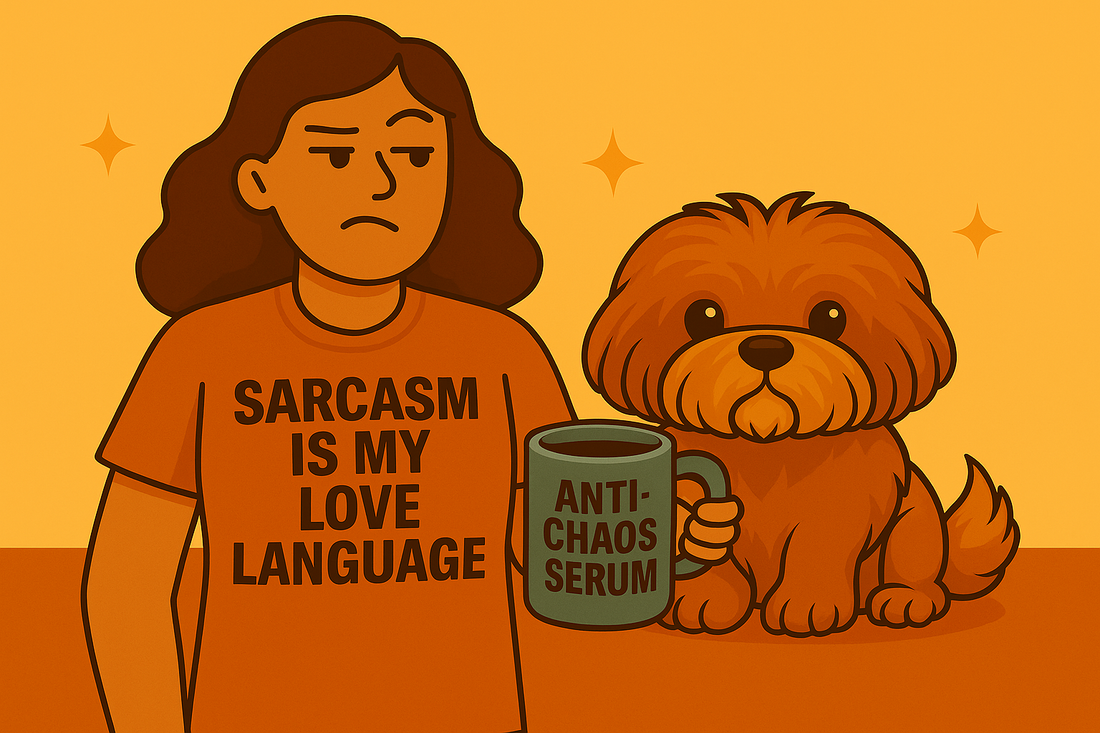
Sarcasm as Self Care: A Survival Guide for September
Share
Why September Feels Like an Emotional Marathon
September is secretly the real New Year. Kids go back to school, workplaces ramp up for Q4, and suddenly, you are managing both fall logistics and summer burnout. The result? A perfect storm of emotional exhaustion, invisible labor, and the kind of chaos that can only be softened with humor.
It is tempting to aim for perfect resets — new planners, new goals, new versions of yourself — but perfectionism is exhausting. This is where sarcasm comes in. No, it won’t replace therapy. No, it won’t solve the mental load. But it will make the mess feel less lonely, less suffocating, and (dare we say) a little funny.
Why Sarcasm Counts as Self Care (But Not Actual Care)
Let’s level set: sarcasm is not therapy. It is not mindfulness. It will not regulate your nervous system or heal generational trauma. But it will do three incredibly useful things:
- Release tension quickly – Joking about chaos creates an instant pressure valve.
- Validate your experience – Sarcasm reframes impossible expectations into laughable ones.
- Create connection – Humor is one of the fastest ways women signal “same” to each other.
Self-care does not always have to be about meditation apps or $20 face masks. Sometimes it is about saying, “If one more person adds to my to-do list, I will simply run away and join a feral cat colony.” The laugh itself is a tiny act of relief.
The September Survival Guide: Using Humor Without Losing Yourself
1. Reframe Your Inner Monologue
September brings endless “shoulds.” Instead of spiraling, answer them sarcastically.
- “I should really color-code the family calendar.” → “Or I could light it on fire and let the school send reminder emails.”
- “I should start a new morning routine.” → “Yes, nothing screams sanity like waking up at 5 am to do yoga with YouTube.”
Sarcasm does not dismiss the pressure; it reminds you that the expectations are ridiculous in the first place.
2. Wear the Mood Out Loud
Self-expression matters. Graphic tees, mugs, and totes that declare “Not Today” or “Soft But Screaming” become conversation starters — or conversation enders, depending on your social energy. They give you permission to stop performing “togetherness” and let the world know where you are at emotionally without having to explain yourself.
3. Make Everyday Rituals Funnier
Self-care advice often romanticizes mornings: lemon water, journaling, and sunrise yoga. Cute. Reality? Most of us are reheating coffee for the third time. Add sarcasm to the ritual, and suddenly it feels lighter.
- A mug that says “You’re Fine, Probably.”
- A journal entry titled “Things I Meant to Do But Didn’t.”
- A tote that literally carries both your laptop and emergency chocolate.
The ritual doesn’t have to change — just the lens through which you view it.
4. Practice Snarky Journaling
Journaling clears mental clutter. But it does not have to be profound. Try categories like:
- Petty Gratitude: “Grateful my kid’s soccer practice got canceled so I can lie down.”
- Emotional Weather Report: “Today’s forecast: 70% chance of spiraling, 30% chance of snacks.”
- Reverse To-Do List: Instead of “wash laundry,” write “successfully ignored laundry again.”
The humor keeps it from becoming one more chore and helps you get honest on the page.
5. Use Sarcasm as Boundary Armor
Boundaries at work and at home are hard. Sarcasm can soften the delivery without weakening the message.
- Coworker: “Can you just take this on?”
- You: “Of course, because cloning myself is on my Q3 goals.”
It lands as funny, but the point is clear: your bandwidth is limited.
The Science Behind the Snark
Laughter triggers the release of endorphins, lowers stress hormones, and strengthens social bonds. Sarcasm, specifically, helps us process frustration by reframing it as something absurd. That absurdity breaks the stress spiral and creates space for coping.
Does sarcasm fix burnout? No. But it does make you less likely to cry into your iced latte at Target.
Real Talk: Sarcasm Isn’t a Cure
Because here’s the truth: if you are feeling depressed, deeply anxious, or unable to cope, sarcasm is not going to be enough. Therapy, medication, and genuine support are valid, important tools. Sarcasm should be your sidekick, not your substitute. Think of it as the witty best friend who helps you laugh between therapy sessions.
FAQs
Q: Is sarcasm really self-care or just deflection?
A: Both. And sometimes deflection is what you need to get through the moment.
Q: Can sarcasm backfire?
A: Sure. Aim it at systems, expectations, and chaos — not at people you care about.
Q: How do I know if I’m using humor in a healthy way?
A: If it makes you lighter, more connected, or less stressed — good. If it isolates you or keeps you from asking for help — time to balance with other tools.
Q: What if people don’t “get” my sarcasm?
A: Then you found out who you don’t need to vent with. Build your sarcasm circle carefully.
Q: Can sarcasm actually make me more resilient?
A: Yes. Reframing overwhelming situations as ridiculous lowers their power. It turns “I’m failing” into “the bar is impossible,” which is a much kinder truth.
A Laugh Is Still Care
September chaos is unavoidable. But sarcasm makes it survivable. It’s not therapy, but it is a tool that says: “You’re not alone, this is ridiculous, and we can laugh about it while we carry on.”
If your survival kit could use a boost, explore our Sarcasm Edit — tees, mugs, and totes designed to carry chaos with humor. Because sometimes the difference between crying and laughing is just one good line.
